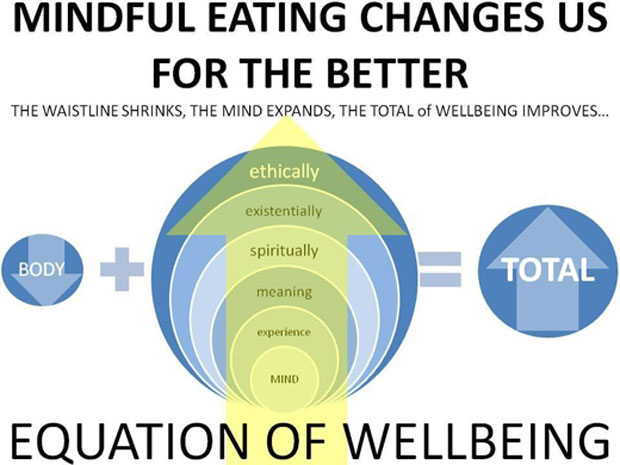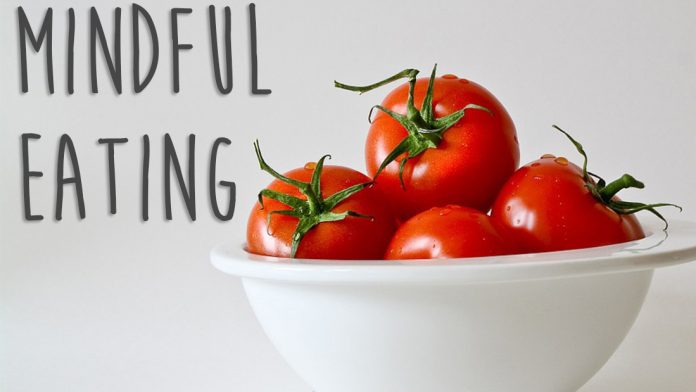Eating is a natural, healthy, and pleasurable activity for satisfying hunger. However, in our food-abundant, diet-obsessed culture, eating is often mindless, consuming, and guilt-inducing instead. Mindful eating is an ancient mindfulness practice with profound modern implications and applications for resolving this troubled love-hate relationship with food.
So, what is mindful eating?
Mindful eating is eating with intention and attention:
- Eating with the intention of caring for yourself
- Eating with the attention is necessary for noticing and enjoying your food and its effects on your body
Mindful eating involves paying full attention to the experience of eating and drinking, both inside and outside the body. We pay attention to the colors, smells, textures, flavors, temperatures, and even the sounds (crunch!) of our food.
Mindful eating is much more than “eating slowly, without distraction.” I believe that mindful eating encompasses the entire process of eating:
- Awareness of your physical and emotional cues
- Recognition of your non-hunger triggers for eating
- Learning to meet your other needs in more effective ways than eating
- Choosing food for both enjoyment and nourishment
- Eating for optimal satisfaction and satiety
- Using the fuel you’ve consumed to live the vibrant life you crave
This broad application makes mindful eating a powerful tool for developing a healthier, happier relationship with food.

The old habits of eating and not paying attention are not easy to change. Don’t try to make drastic changes. Lasting change takes time, and is built on many small changes. We start simply.
How to master the art of mindful eating:
- Start small.Like all new habits, it’s best to set realistic expectations. Choose one meal or snack each day and commit to focusing on mindful eating at that time.
- Stop multitasking at meal times.It’s really difficult to focus on eating if you’re doing other things. Set aside time for eating without other entertainment.
- Only eat at the table.Another way to minimize mindless munching is to get into the habit of only eating when you are sitting down and able to give the food your full attention. No more snacking on the run.
- Appreciate the appearance. While we’ve all drooled over gorgeous food porn in magazines or online, sometimes we forget about the beauty of the food we are about to eat. Taking the time to notice sets the scene for mindful eating.
- Focus on each mouthful. Think about the flavor, texture and even the sound of the food in your mouth. Focus on how much you like, or dislike these sensations.
- Chew. While it can be overkill to go to the monastic extreme of 100 bites per mouthful, make sure you chew your food enough so that it is well broken down before you swallow.
- Use cutlery and put it down between mouthfuls.It’s much easier to take smaller portions when using a knife and fork. Put down your spoon in between bites so you can focus.
- Talk and share.One of the joys of eating is sharing a meal with loved ones. Share what you are experiencing in terms of flavours and textures, likes and dislikes. At first this may seem a little weird but trust me, you’ll soon find yourself having fun with it.
- Go for quality not quantity.By choosing smaller amounts of the best food you can afford, you will not only enjoy it more, you’re far more likely to be satisfied without having to over eat.
- Make time to prepare your own meals, preferably from fresh ingredients.The cooking process can be as relaxing and enjoyable as eating if you let it. For me, the peace of mind that comes from knowing exactly what has gone into my food makes any hassle worthwhile.
I would suggest that if you feel like eating and pause to ask the question, “Am I hungry?” Although it is a deceptively simple title, the question “Am I hungry?” opens the door to understanding why, when, what, how, and how much you eat, and where you invest your energy.
Why?
Why do I eat? Or in other words, what is driving my eating cycle at any given time?
When?
When do I feel like eating? When do I think about eating? When do I decide to eat?
What?
What do I eat? What do I choose from all the available options?
How?
How do I eat? How, specifically, do I get the food I’ve chosen into my body?
How Much?
How much do I eat? How much fuel do I consume?
Where?
Where do I invest the energy I consume? Where does the fuel I’ve consumed go?
Linked with reduced over eating, the real benefit of mindful eating is being able to trust yourself to feel satisfied with less. It reduced the habit of over eating. It will help develop respect for food and you will gain far more pleasure from meal times.
Are you ready to change the way you interact with food? asks Aditi Srivastava





